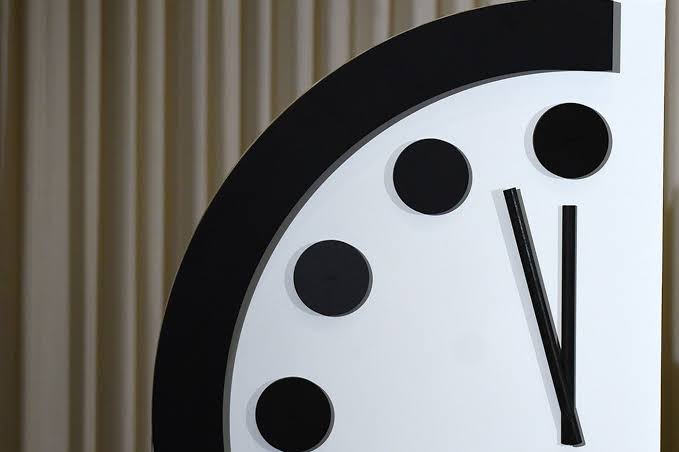
Humankind's quick scramble toward our own devastation is set apart in minutes and seconds in the ticking of the theoretical Doomsday Clock. That we are so near devastating ourselves enlists in the closeness of the clock's hands to 12 PM — the hour of supreme termination.
In 2019, the clock's "timekeepers" with the Bulletin of the Atomic Scientists (BAS) fixed the hands at 2 minutes to 12 PM; that time, set in 2018, is the nearest the clock's hands have come to doomsday since 1953, when the U.S. furthermore, the Soviet Association exploded the primary nuclear bombs.
What's more, presently the anecdotal clock ticks forward; its hands rest at 100 seconds to 12 PM, BAS President and Chief Rachel Bronson declared today (Jan. 23) in Washington, D.C. This new time shows that humankind has entered "into a domain of a two-minute admonition," wherein each valuable second will tally on the off chance that we need to thwart worldwide disaster, Bronson said.
"Peril is high, and the edge for mistake is low," she said.
At the point when the Doomsday Check was presented in 1947, the essential risk to humankind was atomic weapons. That danger despite everything exists today, however, it has organization: disastrous environmental change and problematic advancements are likewise considered by BAS in their appraisal of whether humankind is more secure or more in danger than we were the prior year.
In 2019, atomic and atmosphere conditions kept on crumbling, and choices by worldwide pioneers not just neglected to diminish the harm — they exacerbated things.
"In the course of the most recent two years, we have seen powerful pioneers slander and dispose of the best strategies for tending to complex dangers," Bronson said. Earlier atomic settlements are disintegrating, new understandings between the U.S. also, Russia is no nearer than they were a year prior, and exchanges between the U.S. what's more, North Korea with respect to atomic weapons decrease have been relinquished, as indicated by Bronson.
The shadow of atomic war likewise floats over the Center East; since 2018, when President Donald Trump pulled back the U.S. from an atomic arrangement with Iran, strains between the two countries have stewed. They at last ejected when a U.S. strike executed Iranian military pioneer Qassem Soleimani on Jan. 3. Days after the fact, Iran undermined withdrawal from the atomic arrangement, and Trump recommended that the arrangement's different signatories — Germany, France, and the Assembled Realm — ought to likewise desert the arrangement, however, they have not done as such, Business Insider announced.
While the Doomsday Check was set in November, preceding the U.S. activities against Iran, the occasions of ongoing weeks just affirm the board's appraisal months sooner: "that we are quickly losing our course in an atomic weapons scene that may grow past our acknowledgment," Bronson said.
The improvement of man-made reasoning (artificial intelligence) for use in weapons "that settle on murder choices," and its utilization in military control and direction frameworks is another new reason for concern, said Robert Latiff, a resigned U.S. Flying corps significant general and an assistant employee with the John J. Reilly Place for Science, Innovation, and Qualities at the College of Notre Woman in Indiana.
Indeed, even space has become "another field for weapons advancement" with the declaration of the U.S. Space Power, another division of the U.S. military that incorporates "planning for space battle" as one of its essential objectives, as indicated by Latiff.
Similarly upsetting is the developing storm of "counterfeit news" (and its help by conspicuous government officials) and the ascent of "deepfake" film — carefully controlled video that is progressively hard to recognize from the genuine article. By obscuring the lines among truth and fiction, these advances disturb data and trust, presenting "a perilous worldwide precariousness," Latiff said.
2019 likewise brought disturbing new proof of environmental change's energy and showed its damaging force. Indeed, mankind's disturbance of atmosphere ashore and in the seas is "phenomenal," as indicated by a report discharged in September 2019 by the Intergovernmental Board on Environmental Change (IPCC), the Assembled Countries body that assesses the effects of environmental change.
Comprehensively, the year was the second most sizzling since record-keeping started in 1880, and the previous decade was the hottest on record, NASA revealed not long ago. July 2019 crushed records as the most sultry month at any point recorded on Earth, after a sweltering warmth wave prepared nations across Europe and afterward streamed over Greenland, where it dissolved 217 billion tons (197 billion metric huge amounts of) of ice.
Sea temperatures are hotter than they've been anytime in mankind's history, and they're warming up at a quickening rate. The world's thickest mountain ice sheet is withdrawing, the Sahara Desert extended by about 10%, and the Ice's most steady ocean ice is vanishing.
The extreme dry season in Australia, additionally connected to environmental change, energized destroying wildfires that blasted over the mainland over ongoing months. The flares crushed a large number of homes, harmed delicate biological systems and slaughtered an expected 1.25 billion creatures, as indicated by the World Untamed life Store.
Also, in a report distributed in August 2019 in the diary Science, researchers cautioned that rising ocean levels, outrageous climate occasions, and different calamities, for example, starvations and flames brought about by environmental change could before long make beach front urban areas appalling, dislodging up to 1 billion individuals.
"The condition of the world does, in fact, request a crisis reaction," Sivan Kartha, a senior researcher at the Stockholm Natural Foundation in Sweden, said at the BAS declaration.
In spite of the fact that years have gone since the noteworthy Paris Understanding, a worldwide smaller to decrease non-renewable energy source outflows was marked in 2016, "we're far away course" from accomplishing its objectives, Kartha said. Notwithstanding, ongoing floods in atmosphere activism — in spite of government officials' inaction and across the board disinformation battles that ruin atmosphere science — recommend that the open see the atmosphere crisis as too critical to even consider ignoring, he included.
While the Doomsday Clock denotes the stroke of 12 PM as the hour of humankind's obliteration, in actuality, the numerous dangers of atomic weapons, environmental change, pandemics, and weaponized innovation will more probable ring at an end of the world that "presumably won't be snappy or last," futurist and creator Jamais Cascio wrote in October 2019 for the diary BAS.
"It will be a domain of wretchedness, not an occasion or an endpoint," Cascio composed. "Albeit most pessimistic scenario situations hypothetically make it simpler to forestall critical results, on account of moderate moving apocalypses, for example, environmental change, it's hard for people to imagine the size of the issue and to envision how we will really encounter it," he clarified.
By the by, anyway huge the danger of obliteration lingers, that doesn't mean all expectation is gone, Cascio included.
"On the off chance that we can't stop the fiasco, maybe we can limit the damage," Cascio said. "Generally significant, recognizing the sheer flexibility of humankind may be the kick expected to continue battling, in any event, when things look lost."

